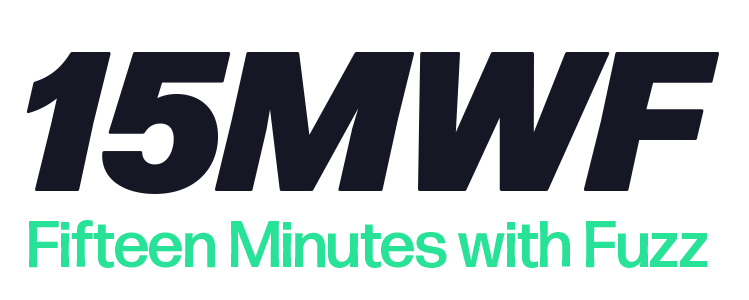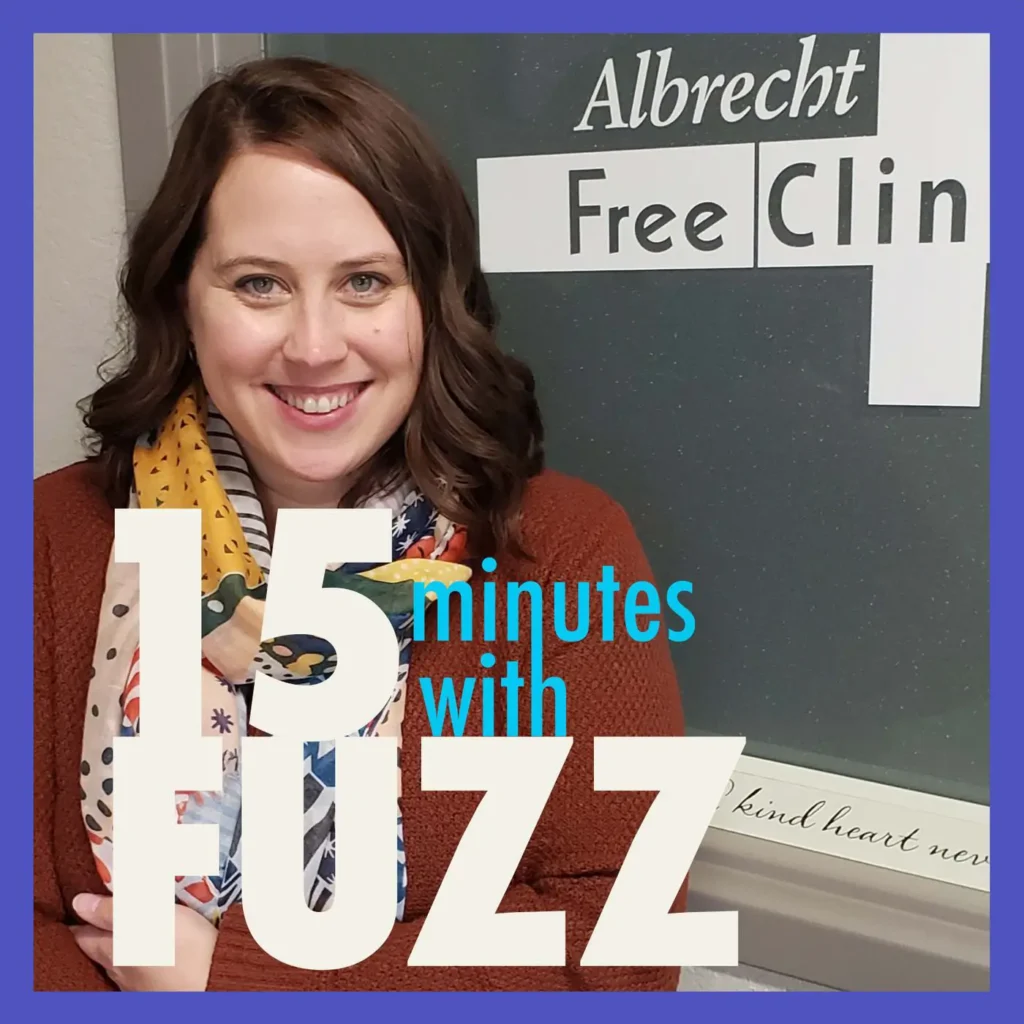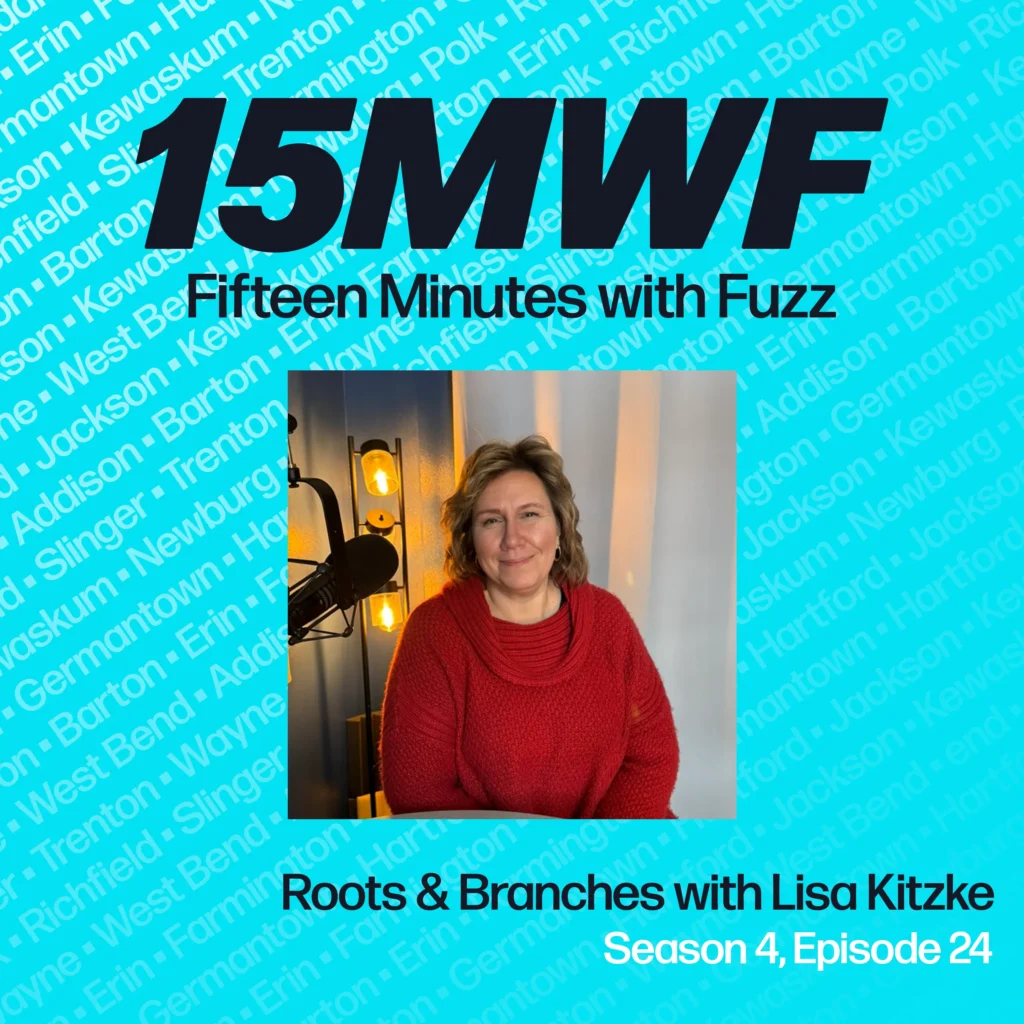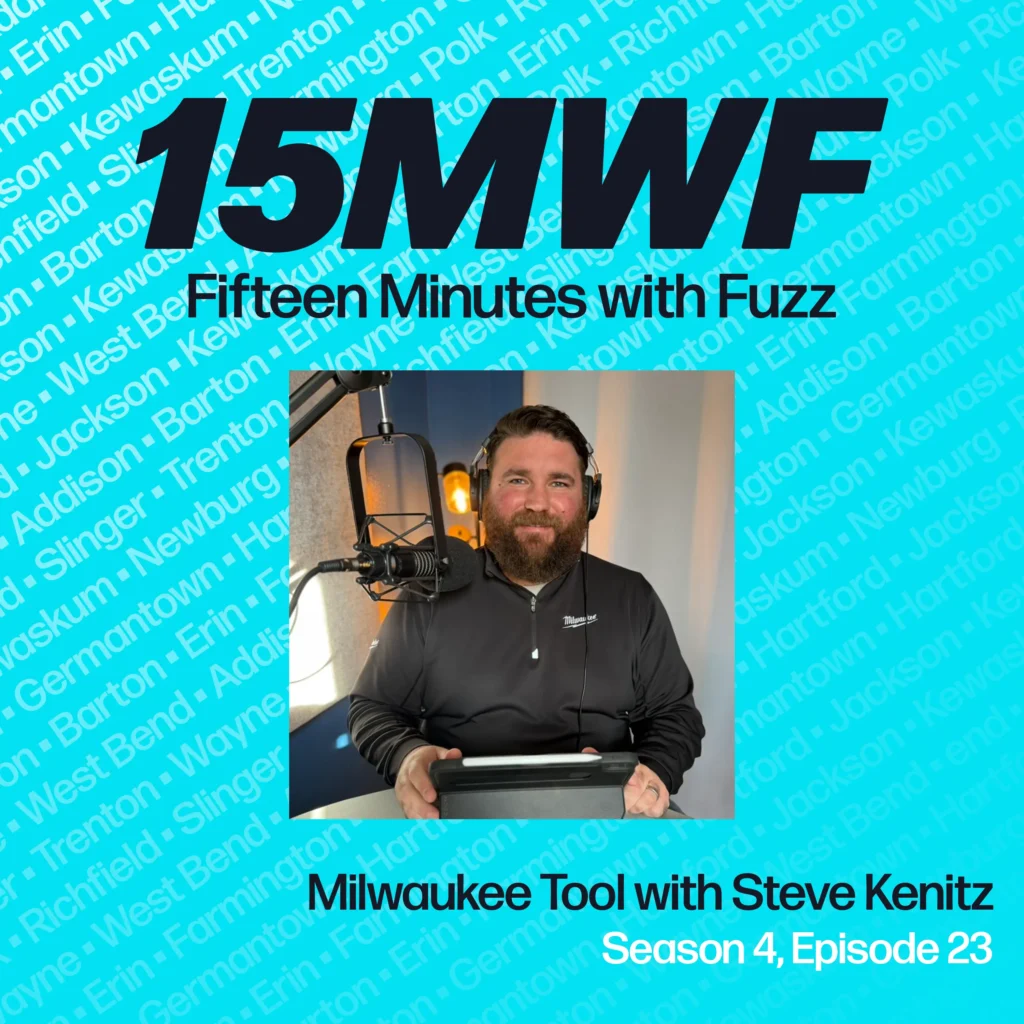[00:00:00] Fuzz Martin: There you are! Hi! It’s so good to be here with you, in your car, sitting on your desk, in your pocket as you walk the dog and try not to freeze your butt off. Thanks, November. And thank you for listening to Fifteen Minutes with Fuzz. I am your host, Fuzz Martin, and each week, we explore positive things happening in our hyper local community.
Little community of Washington County, Wisconsin. And while we’re just exploring things from this county and sometimes those things surrounding the perimeter of the county, there are so many things happening around here and I am constantly amazed by all of it. And if there’s something that you think I should be exploring.
Please reach out to me, 15withfuzz at gmail. com, or you can use the contact form on the website at 15withfuzz. com. I have a few openings between now and Christmas that I’m looking to fill, and I would love to hear what you would like me to share with the rest of the world, but mostly the rest of the world being Washington County.
Speaking of that, this week’s suggestion came from the website. Today we’re speaking with Melanie Gonring. She’s the Associate Director at Albrecht Free Clinic in West Bend. There is so much good going on at Albrecht Free Clinic and there has been for 25 years.
So 2021 is a big year for the Albrecht Free Clinic. You’re celebrating the 25th year of providing medical and dental care to individuals who live or work in Washington County. We’re uninsured or underinsured and the Albrecht Free Clinic has been a great part of our community. It’s something that a lot of people care about and a lot of people are always looking to support.
So I just want to say one, thanks for joining me today and also congratulations on 25 years.
[00:02:12] Melanie Gonring: It’s been an awesome year for us already. Actually just back in August was the official anniversary of receiving our nonprofit status back in 1996. So, yeah, we’re kinda just, just hit that 25 year mark and looking for ways to honor the past but also build the future, so.
[00:02:30] Fuzz Martin: When I was looking at the timeline and I saw it was 1996, the clinic started, and that was 25 years ago. I realized that, uh, it was my 25th school anniversary this year, and I, high school, and I, because of COVID and all of that, I didn’t even put two and two together. I probably wouldn’t have gone to an event anyway.
Yeah, right.
[00:02:52] Melanie Gonring: We, we’ve struggled with that a little bit, how to celebrate, but, um, we are. are right now hoping to do something next spring to celebrate.
[00:02:59] Fuzz Martin: Great, great. And so tell us more about Albrecht Free Clinic and the impact that the clinic has on individuals who live or work in Washington County. What services does the clinic provide?
[00:03:11] Melanie Gonring: Well, like you said, it is hard to believe 1996 was 25 years ago, but, uh, but it was. And ever since then, the Albrecht Free Clinic has really been The only safety net of care for individuals in our community that have nowhere else to go. So a lot of the patients or the patients that we see are making too much money to qualify for state care, state insurance, but they’re not really making enough money or, you know, they’re working multiple jobs, multiple part time jobs, or they’re working for employers that don’t offer insurance.
And so they aren’t able to afford even purchasing a plan if that’s offered to them. So. We really strive to keep people out of emergency departments for small things, especially now in the last couple of years, that’s even more important. So we offer medical and dental care to individuals who meet our guidelines right here at our clinic.
So I can tell you this year, we are just kind of gearing up for all the year end statistics. We have completed 766 medical visits, and and 942 dental visits.
[00:04:18] Fuzz Martin: Oh, wow.
[00:04:18] Melanie Gonring: Yeah. So, I mean, the impact just, you know, to help keep our community healthy and getting people back to work in a timely fashion is really what, what we’re here to do to kind of fill that gap.
For people who, who need somewhere to go that don’t know they have somewhere to go.
[00:04:32] Fuzz Martin: So Dr. Albrecht saw that need back in, probably before 1996. How did the clinic begin?
[00:04:39] Melanie Gonring: Sure. Well, um, like you said, Dr. Albrecht was a long, long time doctor in the area, especially in Jackson. And he actually saw patients out of his home in Jackson until 1983 when.
He joined with a larger system here in West Bend, but he always saw that need and he was always the guy who was willing to help anybody. You know, he saw someone on the side of the road, he’d pull over. You could only pay him in eggs, he would take your eggs. So he kind of has a long legacy of doing whatever he could to make sure people got the care that he needed, they needed.
So he had the vision to start the free clinic. So we were established in 96 as Donated Healthcare Services. And grew from there. When Dr. Albrecht passed away in 2001, the clinic was renamed in his honor. And we really strive today to keep his legacy alive and, and keep doing, you know, what, what he saw a need for long before many others did.
[00:05:35] Fuzz Martin: And certainly you’re carrying forward his legacy and kind of that mission that he had. Or even just that personal value that he had that drove that. Again, those numbers that you gave earlier, that’s a lot of people that you’re helping in our area.
[00:05:50] Melanie Gonring: It is. So, in our medical clinics, I should say, we see people for acute needs.
We have two evening clinics a week on Tuesday and Thursday evenings. Historically, they’ve been walk in clinics. But due to COVID, they are by appointment right now, but I don’t want that to turn anyone away. If, if they need our help, please call us. Sure. Um, so those are for more of, you know, your typical, I hate to say, you sore throat is my example, but just those one off needs that you’d go to your doctor for when, when you’re having some pain or an issue.
Then we also do chronic care visits during the daytime for patients who are dealing with issues like hypertension or diabetes and need that more consistent care with their doctor. And then our dental program does everything from your basic hygiene to, to any dental procedures you need done all the way up to dentures, if that’s what the dentist, you know, deems is the right step.
So really a full array of, of services at the clinic. And if we can’t do it and you’re one of our patients, we work with partner agencies and other healthcare providers to provide vouchers. So if there’s lab work or imaging that we can’t do at our clinic, We still help, you know, get that done for people.
Get a voucher, go to
[00:07:01] Fuzz Martin: another facility, get that done and then come back. Um, so it sounds like that’s a lot to, I mean, you’re, you’re helping a lot of people. There’s some very specific health training that you need to be there. So what, what goes into running the Albrecht Free Clinic? What do you guys need to stay in operation?
How does that run?
[00:07:22] Melanie Gonring: Yeah, well, first and foremost, I will use this as an opportunity to thank our volunteers. We are almost completely a volunteer run organization in terms of our medical providers. The doctors are coming to our office after a long day at their own clinics, you know, working. Crazy hours right now, all of the volunteers are there because that’s truly a passion of theirs and it’s a way for them to give back.
So without the medical and dental providers giving of their time, that’s a huge thing. We’re fortunate to have great relationships with both of the, the area healthcare providers, the FreightArt system and the Aurora system are incredibly generous in helping to provide the supplies that we need to function.
I think any nonprofit you interview here will say funds are extremely important as well because while we do have great community partnerships and funders, there’s always a gap. And so to keep, you know, it’s, it’s expensive to run a clinic. And um, so always people who are willing to give is a huge thing for us.
[00:08:32] Fuzz Martin: Yeah, definitely. And speaking of the volunteers, what kinds of volunteers does the Albrecht Free Clinic need?
[00:08:38] Melanie Gonring: Yeah, that’s a great question. You do not need to have medical experience to be a volunteer at the Albrecht Free Clinic. We have. Many volunteers that help us with, you know, on the business side of things, checking in during clinics, checking in patients, helping to keep us organized, doing those backroom projects that we always have as nonprofits.
One of our huge needs for volunteers is actually, um, volunteer interpreters. we work with a large Hispanic population, many of which exclusively speak Spanish. And so most of us at the clinic, if not all of us who are on staff and our doctors, do not speak Spanish. So we have some great tools like an iPad that, translation services that help, but nothing beats that one on one.
Right. So if there’s any Spanish speakers out there who are looking to give back in that way, that would be amazing. And then the medical and dental volunteers. We have dentists and hygienists and dental assistants that volunteer, the doctors, the nurses. We always need more nurses, so.
[00:09:42] Fuzz Martin: Sure.
[00:09:43] Melanie Gonring: It’s a hard ask right now because I know, you know, the healthcare community is doing so much and their plates are pretty full, but.
[00:09:50] Fuzz Martin: Right. Work and extra hours and obviously this last almost two years now have been pretty tough on that all around, but. Yeah. Yeah. The, the cause of Albrecht Free Clinic is great and making sure that people can get the care that they need, no matter their income level or their insurance level or what that might be, Albrecht Free Clinic helps bridge the gap and make, uh, make sure that everybody in our community is cared for and that’s really important.
[00:10:17] Melanie Gonring: Absolutely. And the time commitment is not huge, especially in those nursing, uh, physicians. Thanks. usually chip in about once a month. So it’s once or twice a month for a few hours. Speaking of hours, I wanted to share an awesome number.
[00:10:31] Fuzz Martin: Sure.
[00:10:32] Melanie Gonring: So far this year, our volunteers, those are the medical, dental, you know, administrative volunteers have logged.
Over 2200 volunteer hours. So when I say we couldn’t operate without them, we truly could not.
[00:10:46] Fuzz Martin: So that’s great. And again, it’s helping our neighbors. You know, it’s, it’s great. So Melanie, what, what are, if somebody can help, if they want to make a donation, do you guys have events coming up? What’s aside from volunteering that people can help?
[00:10:59] Melanie Gonring: Yeah, well anyone can donate through our website. We have a PayPal link right there on our website, so it’s a safe and secure way to give. We also, like I kind of teased earlier, we’re hoping to have some kind of Big fundraising event potentially in May next year. So if all goes well, we’re all knocking on wood, but um, I wouldn’t, we’ll have, they’ll stay tuned.
There will be more information about that. And then also, you know, there are lots of things that people could do within their own groups that they’re part of. So we recently just hosted a community wide coin drive in partnership with Westbury Bank and a number of churches. Got involved with that, some businesses, some schools, Silverbrook Middle School called us last week.
They, they actually ran their coin drive. in October because it worked better than our September date. And they said, we have 366 pounds of coins to give you because they had a competition. And
[00:11:55] Fuzz Martin: so
[00:11:56] Melanie Gonring: they weighed them instead of counting them all. I’m like, I went to pick them up. I’m like, I have no idea what that looks like.
What is it? It ended up being 20 over 2, 400 actually just shy of 2, 500. It was incredible. And so I would encourage, you know, people who are part of a, a civic organization or a book club, like, you know, looking for something to do for the holidays, find a fun way, you know, we’ll always take your coins that you can give back.
We also, you know, throughout the year, um, have people donate personal hygiene items, toothpaste, toothbrushes that we can give out to our patients as they’re, you know, heading out from their appointments. Sure.
[00:12:38] Fuzz Martin: And then finally, if. Somebody needs healthcare assistance or needs dental care and they’re unsure of if Albrecht Free Clinic is appropriate for them.
How do they find that out?
[00:12:55] Melanie Gonring: Yes. On our website, which is albrechtfreeclinic. org, you can find all of the guideline information. So in order to be seen at the clinic, you have to either live or work in Washington County. So we do have some patients who, who live outside, but if your job is here, we are happy to see you.
You cannot have any insurance coverage if you have insurance. Um, unfortunately, you know, we’re here for the uninsured and your income level has to be below 200 percent of the federal poverty guidelines. There is a chart on our website, because it’s different depending how many people are in your family.
If you qualify. So I would encourage people to check out our site for that information or give us a call. We’re happy to, to talk you through the application process and trying to make it as simple as possible so we can get you seen for what your needs are. And I think, I just wanted to touch on that, and we’ve been here for 25 years, but the number of people I meet who still say, I didn’t know we had that.
It’s huge because if you don’t, if you’re not in need of the care, you’re not thinking about it all of the time. So I, one of the things that we’re really hoping as we’re promoting 25 years is just the awareness level and hoping that, you know, if you hear someone at work or a neighbor or at church that is struggling and needs a little help, please tell them about us.
Sure. You know, in order to keep going, we also need, need more people to come. We know the need is great. We’ve grown so much over the years and we’re lucky to add the dental program in 2016. That’s a huge need in the community, but we can only, you know, do our work if people know to find us. Right,
[00:14:35] Fuzz Martin: right.
Absolutely. So alre free clinic.org and I’ll put the phone number in the description of this show. So you can just go in there and, and copy that if you need it. And if you want to help out or if you need care, uh, again, check them out. And uh, Melanie, thank you so much for Al Vet Albrecht Free Clinic. Does, and thank you for coming on the show.
Yeah,
[00:14:54] Melanie Gonring: thank you so much.
[00:14:59] Fuzz Martin: Thanks again to Melanie garnering of the Albrecht Free Clinic. That’ll do it for the 17th episode of 15 minutes with Fuzz. If you like this show, thank you. I like you too. Uh, please be sure to subscribe on Apple podcasts, Spotify. The one I use is called good pods. It’s a good one, hence the name, but also it allows you to interact with the host and such wherever you listen to wherever you prefer to listen to podcasts.
We appreciate it. New episodes every Monday. Thanks again for listening. And have a great week.




